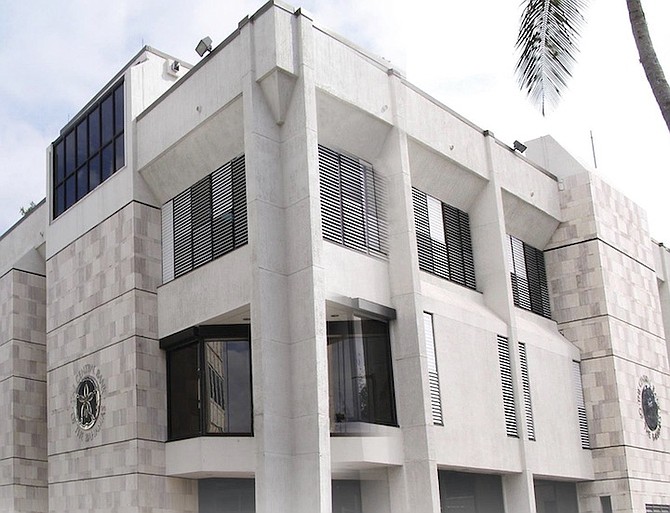By NEIL HARTNELL
Tribune Business Editor
nhartnell@tribunemedia.net
The Central Bank’s governor yesterday disclosed it is lifting the near three-year bar on new entrants to the money transmission and digital payments business with the market now on “a stable footing” post-COVID.
John Rolle, in his quarterly economic briefing, explained that the moratorium on new competition in December 2019 was imposed to allow the industry “to settle a bit” and prevent it from becoming over-saturated due to an influx of operators.
He added that this was now being removed because the sector, which features players such as Kanoo, Island Pay, MoneyMaxx, Cash N’ Go and Sun Cash, has evolved to the stage where the regulator can once again consider innovative business proposals for licensing despite suggesting that “consolidation” needs to occur - a process that will reduce the number of operators.
“When the Central Bank suspended the review of applications, there was a lot of new activity and entrants in the market,” Mr Rolle said in response to a Tribune Business question. “The [Central] Bank wanted the sector to settle a bit before it continued with entertaining applications.
“Having seen the sector evolve, we believe it is time to again look at business models and proposals that are coming rather than continue to deny any consideration of potential interest in the market. On the basis of the business models which come forward, we’d be in a more open position to determine what happens in the market. It’s really about moving from a very rigid posture taken when things really started to pick up at the end of 2019.”
Speaking to the issue earlier in the briefing, Mr Rolle added: “In relation to domestic money services, the Central Bank is lifting the moratorium on new applications for licences to offer money transmission and payments services to the retail sector. With pandemic conditions abated, in the Central Bank’s view, this sub-sector is in a better position to establish a stable footing and provide expanded services to the Bahamian public.
“While money services activities could benefit from some consolidation over the medium-term, however, this sector can also begin to profit from innovative, viable and sound new business models, though in keeping with strong financial inclusion outcomes.” Expansion in the sector will also aid the Central Bank’s drive to roll-out and encourage greater adoption of the Bahamian digital dollar, the Sand Dollar.
Elsewhere, Mr Rolle said foreign currency inflows for 2022 were on target to exceed pre-COVID records of $6bn and are 40 percent up on 2021. “Although tourism is still completing its recovery, private sector foreign currency inflows through the commercial banks are on course to surpass the pre-pandemic records,” he added.
“This reflects the added impulse from significant and rising foreign investment flows in areas such as residential real estate and tourism infrastructure, which have both stimulated construction activities. Over the first nine months of 2022, measured forex (foreign exchange) inflows have increased by 40 percent in comparison to 2021. This leaves forecasted outcomes for 2022 on course to outpace the pre-pandemic high of $6bn that was recorded in 2018.”
Turning to the impact on The Bahamas’ foreign currency reserves, which support the one:one peg between the Bahamian and US dollars, Mr Rolle said: “Within the more sustainable mix of foreign exchange inflows and usage, the private sector contributed to nearly half of the estimated $746m growth in external reserves over the first nine months of 2022.
“In 2021, by contrast, the sector was still making a net drawdown on the reserves. As of today’s date, the reserves are approximately $3bn. Over the remainder of 2022, balances are expected to decrease in line with the normal seasonal pattern of elevated third and fourth quarter net imports. However, balances are still expected to close out the year higher than they were at the end of 2021.”
Mr Rolle said domestic credit to the private sector had contracted slightly during the first nine months of 2022, and is “expected to become only mildly positive over the near-term. In the context of strengthening deposit growth, the liquidity in the system is therefore likely to remain elevated, keeping average deposit rates from rising”.
The Central Bank’s governor said “the capacity is more than adequate”, in terms of the $2.3bn in commercial banking system liquidity, to meet the Government’s strategy of financing most of its projected $564m fiscal deficit for 2023-2024 in Bahamian dollars from the local capital markets. And the possibility that some of this borrowing may leak out in foreign currency to pay for imports will not undermine the foreign reserves.
“There’s no concern that government’s financing in the domestic market will lead to any worrisome trends in terms of the use of foreign exchange on imports or the foreign reserves,” Mr Rolle said, adding that institutional investors - such as pension funds and insurance companies - were displaying increased appetite for government securities as their cash flows rebounded after COVID-19.
“Retail depositors, particularly, are encouraged to invest more in the available medium and long-term domestic bonds of the Government. The Central Bank will target this market segment, as it works with the Government to introduce a savings bond scheme. Existing liquidity is already supporting stable to increased investments in Government instruments by financial institutions and institutional investors,” he added.
Mr Rolle said the relaxed debt service ratios and down payment requirements that prospective borrowers must meet, while giving lenders greater flexibility, are “only expected to have a small impact on total credit trends”. And the Central Bank is “closely monitoring market demand”, and “will continually assess if and when a cut-off should be imposed” to the elimination of the 5 percent investment currency market premium to allow locals to invest in the Government’s foreign currency bonds.





Commenting has been disabled for this item.